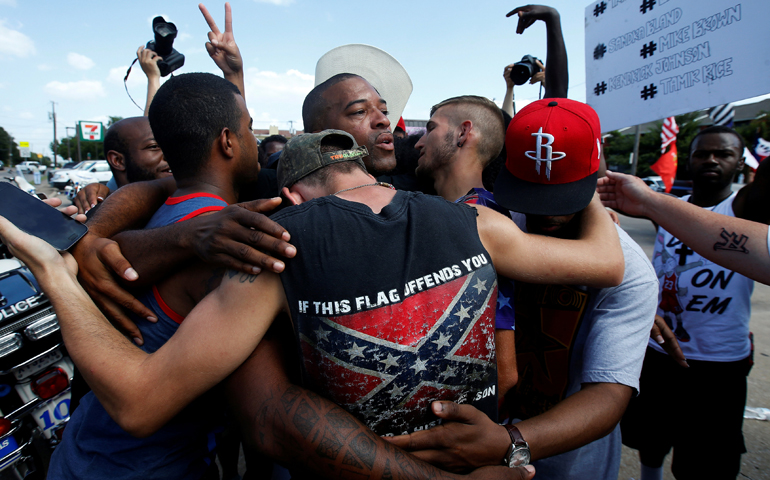
Men embrace after taking part in a prayer circle July 10 following a Black Lives Matter protest in the wake of multiple police shootings in Dallas. (CNS/Carlo Allegri, Reuters)
NCR readers, I imagine, all know about the concept of implicit bias. It’s when the pretty white girl gets called on more frequently, the bank loan officer demands more credit worthiness from blacks, and the police officer stops black pedestrians more frequently than whites. Etcetera.
And, because we are people of good will, we strive to be unbiased. A few years back National Public Radio ran a "Race Card Project" on both Morning Edition and All Things Considered. Michele Norris asked listeners to submit six-word statements about race. I never submitted one but what I wrote in my head was along the lines of: "I always have to prove myself." My feeling was that blacks viewed me suspiciously.
Well, duh. I was right. They do view me suspiciously. That's my conclusion from reading books like Citizen by Claudia Rankine, watching movies like the small independent film "Four-Way Stop" by Efi da Silva, generally reflecting about my relationships with blacks, and listening to all the prevailing analysis.
More importantly, it is not about me. It's that blacks experience so much disrespect from whites that they are at least a little suspicious of us all. It took me time to work through that concept.
The New York Times and POV (a public television division) have created six 3-minute videos about implicit bias. I just watched them straight through. They are not groundbreaking. They take what we are generally familiar with and give us whites some specific behavior tools like taking a personal inventory of our acquaintances and being aware of our own self-consciousness. Like the Race Card Project, even if you are pretty sophisticated about implicit bias, if you are white, it might be worth investing 20 minutes in viewing these videos.
And if you are tough enough, if you've overcome some of your white fragility, read the New York Times op-ed piece (subscription required) by Michael Eric Dyson, "What Donald Trump Doesn't Know About Black People," that concludes: The real unifying force in American political life is whiteness, no matter its party, gender, region or, at times, even its class.” If we want to be unified by love and justice, we have work to do.



